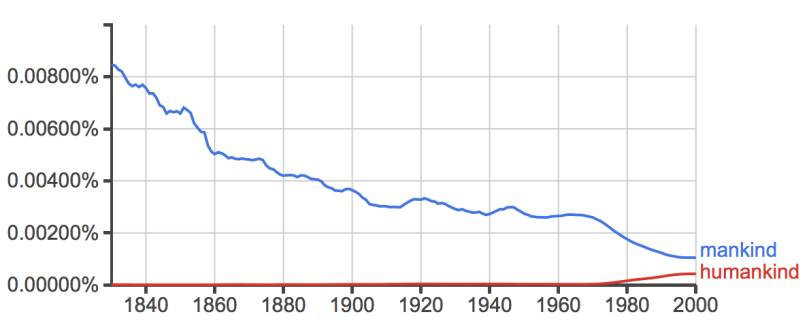Last fall in General Conference, the word “mankind” came up many times from the lips of Pres. Uchtdorf, Elder Gavarett, Sister Marriott, and the late Elder Perry, among others.
But that’s hardly unusual. In fact, most Mormons don’t blink an eyelash when we hear “mankind” used in church to refer to “all people,” women included.
It’s in our curriculum, like the adult lessons “The Origin and Destiny of Mankind” and “Jesus Christ Redeems All Mankind from Temporal Death.”
It’s in our scriptures, both the King James version of the Bible and the Mormon-specific texts that make up our Standard Works.
It’s so familiar that it’s surprising to realize that in fact, General Conference usage of “mankind” peaked in the 1970s and has been declining ever since: This dropoff in Mormon usage since 1970 mirrors what’s going on in the wider English-speaking world:
This dropoff in Mormon usage since 1970 mirrors what’s going on in the wider English-speaking world:
 As you can see here, “humankind” has become one of the many go-to replacements that English speakers have come up with. By 2000, “mankind” only outstripped “humankind” by a factor of 2.4 to 1 in the wider culture.
As you can see here, “humankind” has become one of the many go-to replacements that English speakers have come up with. By 2000, “mankind” only outstripped “humankind” by a factor of 2.4 to 1 in the wider culture.
But “humankind” has not caught on in the LDS Church. Although Mormons use “mankind” less often than we used to, we still use it far more often than the wider culture does.
That difference is much greater. As in, what-decade-are-we-living-in greater.
In the 2000s, the last full decade for which we have Conference talks, “humankind” was used just eight times total. In contrast, “mankind” occurred 202 times, outstripping “humankind” by a factor of 25 to one.
 Why is this growing linguistic divide between the LDS Church and the English-speaking world important?
Why is this growing linguistic divide between the LDS Church and the English-speaking world important?
It helps to examine a bit of history. The term “man” derives from the Old English word “mann” from over a thousand years ago, and indeed, the etymology suggests that in its own context, “mann” did mean all people, including women.
We know this because there was another word, “wæpenmann,” which indicated a person “with a weapon and/or penis.” That’s pretty direct.
But language has evolved over the last millennium – indeed, as we have seen, it’s evolved markedly in just the last half century. While history saw the use of “mankind” to refer to all people, that’s far less the case today, when popular alternatives like “humankind,” “humanity,” and “the human race” abound in the language and are gaining in popularity.
So why are Mormons holding on to “mankind”?
First, there’s an argument to be made for our collective stubbornness where language is concerned. After all, we are the folks who pray to God using what are now the most formal, archaic second person pronouns available (even though, ironically, “thee” and “thou” were once the most familiar, friendly ways of approaching another person, while “you” was so formal as to be off-putting).
We love us some King James English.
But the darker argument, the one that plagues me when I hear “mankind” used in Conference and see it in our curriculum, is that we are simply not thinking of the importance of women.
It’s possible to make a legitimate historical case that the word “mankind” used to refer in a gender-neutral way to all people. This was true even as late as Neil Armstrong speaking of “one giant leap for mankind” back in 1969. “Mankind” used to be almost universally accepted and few people explored alternatives (though there’s a fascinating overview in the new book Between You & Me of various writers who have tried).
However, the English language has changed since then, and it’s harder to make that argument linguistically now when so many legitimate gender-neutral options exist.
If “mankind” is a term that indeed represents both genders equally, logic suggests it should be interchangeable with “womankind,” with both words serving double duty to refer to all people and to their own gender specifically, depending on context. But somehow I don’t think we’ll be seeing general authorities say that “the gospel is for all womankind” anytime soon unless they are specifically addressing the Relief Society.
At this point, for the Church to hold on to “mankind” almost feels like a deliberate political statement.
And it’s a strange statement, frankly, considering that Mormon leaders’ persistent use of “mankind” to refer to all humanity occurs even as the Church reifies gender differences and insists on a binary distinction between male and female.
In fact, the subsuming of the female population under the masculine umbrella term “mankind” is the only example I can think of where the LDS Church sets aside its strict division between the genders and cheerfully agrees to lump them both together, lexically making women into men.
In “The Family: A Proclamation to the World,” we are taught that gender is an essential and eternal characteristic, and that men and women have separate divinely appointed roles.
Except, apparently, when it comes to language.





